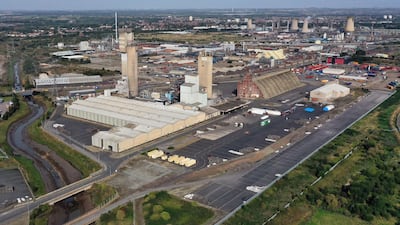The words 'humane animal slaughter', 'nuclear power safety' and 'medical requirements' do not often appear together in the same sentence. But all are reliant on a key ingredient: carbon dioxide.
Shortages of the gas in Britain, and potentially elsewhere are having a grave impact. What is going on?
What just happened?
The British government is bailing out a US-owned fertiliser company, CF Industries, with “tens of millions” of pounds from taxpayer coffers.
There has been a surge in ammonia prices. An indirect consequence of that increase has been the two main carbon dioxide factories owned by CF Industries in Britain have shut down because extortionate gas prices were leading to enormous losses. The CO2 output supplies 60 per cent of UK needs and thus threatened packaging and other vital parts of the food supply chain.
The tremors of rising gas prices are being felt around Europe. The International Energy Agency [IEA] has asked Moscow, which is the continent's main source of energy supplies, to open up the pipeline taps as the squeeze bites.
But there are fears Russia is unlikely to do so unless its Nordstream 2 pipeline to Germany is signed off.
Carbon dioxide? Why do we need that?
Suddenly – and with some irony given the causes of climate change – people have discovered we’re actually rather reliant on carbon dioxide not only for energy but also for aspects of everyday life such as food and health care.

The importance of CO2 in everyday life is being understood by the wider public. It’s used to cool nuclear power plants, to stabilise body cavities during medical procedures and to stun pigs and chickens during slaughter. It also prevents bacteria forming and extends the shelf-life of meat and vegetables. Furthermore, CO2 is used in fizzy drinks and beer, can purify drinking water and help grow vegetables in greenhouses.
Is the UK government to blame for this?
Largely, yes. In 2017 the Conservative government shut down Britain’s last major gas reserve plant in Yorkshire, reducing the nation’s gas storage capacity to 1.7 per cent of annual demand. Other major European countries have a strategic reserve of 20 per cent.
Could this crisis spread beyond Britain?
Certainly. European countries may now also be at risk of contagion. Nippon Gases, a major international distributor selling an annual $1.5 billion of industrial gases to Europe, has given warnings that the continent might suffer shortages after supplies fell by 50 per cent across the region. Record natural gas prices are crippling the profitability of European fertiliser plants, possibly leading to more CO2 provider shutdowns.
What does the future look like?
Potentially bleak, particularly if Russia keeps up the squeeze, and after all, Gazprom is currently raking in millions of extra dollars with the high prices.
Meanwhile, fears have been raised that Britain might return to a 1970s style three-day working week to conserve energy in the manufacturing sector.

The UK government will be quietly hoping for another unusually mild winter. Currently Britain is experiencing a balmy September using 155 million cubic metres per day in gas whereas the winter peak is 385 mcm/d.
There has also been an unusual shortage of big autumnal blows to drive its large North Sea wind turbine farms. Weather forecasts have rarely been more closely examined.
What can be done in the long-term?
It is also more of a reminder that while clean energy is great, it is reliant on wind, sun and rain to work. Nuclear plants will be needed too, in the move from fossil fuels.
And novel ways will be required to harness carbon dioxide. Breweries have already invested in technology to harness the gas during the fermentation process.
The government may also consider subsidies to build new carbon dioxide plants.
It’s also clear Britain needs to look at its strategic energy supply. There is nothing quicker to denude a government of voters than empty supermarket shelves, blackouts and spiralling energy prices.


